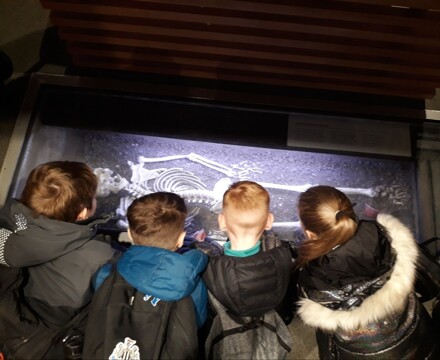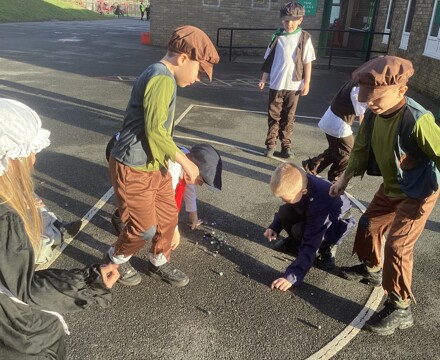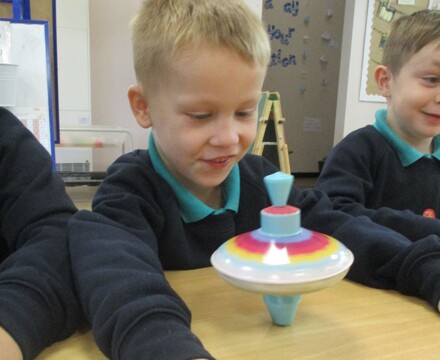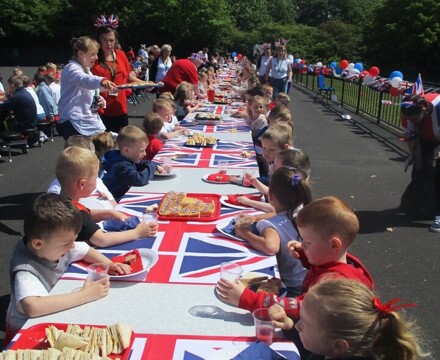- Home
- In the Classroom
- Subject Information
- History
History
BackVision and Aims
At Oxclose we feel that History is an important part of a child’s education. We feel that children should have a deep understanding of their local history, as well as learning about history from around the world. We are lucky in this area to have such a wealth of local history and throughout school, we study important local places and events, from how mining shaped the Washington we have today, to the impact World War II had on the North East. Children have the opportunity to build an overview of Britain’s past, as well as in the wider world, in order to develop the understanding and skills needed to be a good historian. As they move through school, children also have the opportunity to build on their disciplinary knowledge, including use of source work. Our aim is to ignite a curiosity to learn about the past that will help children understand who they are and how their environment and the world has changed over time.
At Oxclose our History curriculum aims to ensure that all pupils:
- Develop a curiosity to learn about the past.
- Understand the history of their local area.
- Develop a broad historical and cultural awareness.
- Have opportunities to develop a chronological framework by investigating the past and how it influences the present.
- Have opportunities to interrogate evidence and form their own opinions.
- Have an understanding of and can use a variety of appropriate vocabulary.
- Have access to a range of sources of information.
- Foster enjoyment, empathy and curiosity for finding out about the past.
Sequencing Rationale
History is one of our driver subjects within school and the History Long Term Plan follows the National Curriculum. The Long Term Plan ensures that the curriculum is bespoke for our pupils and includes local History links.
KS1 – Topics covered are closer to memory, things they can relate to and understand.
Y1 - Children learn about things they can relate to and are closer to memory.
Y1 - Gives the children basic skills and understanding they will need into Y2 and beyond e.g. learning about King Charles III in Y1 in order to have a basic understanding on Monarchy ready for the Victorians inY2.
Y2 – Children still learning about things that are closer to memory but beginning to expand this a little to events beyond living memory, building on the skills from Y1.
KS2 - 3 main strands in each year group – World, British and Local.
Children are taught substantive knowledge e.g. people, periods and stories from the past. They are also taught disciplinary knowledge e.g. similarity and difference, interpretation, continuity and change, cause and consequence and significance.
Extraordinary Opportunities
At Oxclose, we provide a number of extra-curricular activities linked to History. Each year, the children take part in visits and themed days linked to the curriculum and wider events. Many of these link to our 11 by 11, giving all of our children the opportunity to experience a wide range of activities and experiences.
Autumn Term - Y2 Victorian Day, Y4 Arbeia Roman Fort.
Spring Term - Y2 Discovery Museum – Great Fire of Newcastle & Gateshead (H)
Summer Term - Y1 Beach, Y3 Beamish Museum – Mining, Y4 Locomotion
Whole School Events - Armistice Day 11th November
Past events – Kings Coronation, Queen’s Jubilee
Intent
At Oxclose Primary Academy we feel that History is an important part of a child’s education. Our enquiry-based curriculum focuses on key knowledge and building vocabulary. We believe that all children should have a deep understanding of their local history, as well as learning about history from around the world.
Throughout school, we study important local places and events, from how mining shaped the Washington we have today to the impact World War II had on the North East. We study significant individuals, such as Queen Victoria and Grace Darling as well as important individuals linked to our local area, such as George Stephenson. Children have the opportunity to build an overview of Britain’s past, as well as in the wider world, in order to develop the understanding and skills needed to be a good historian. We aim to make all History lessons fun and enjoyable for all children. By learning a range of topics, children will have opportunities to investigate and interpret the past, understand chronology, build an overview of Britain’s past as well as that of the wider world, understand the history of our local area, make connections and be able to communicate historically.
Implementation
History is one of our driver subjects within school and the History Long Term Plan follows the National Curriculum. The Long Term Plan has been developed to ensure it is bespoke for our pupils and includes local History links. History is taught each term in all year groups. Every class has an hour lesson a week. More time is allocated for History during special enrichment events, such as Armistice Day.
Sticky knowledge is identified for each unit of work, this is the knowledge we want pupils to be able to know, and remember, both during the teaching of the unit and after. Within each class, knowledge mats are used and are available each lesson and are also displayed upon a ‘memory wall’ that children can revisit once they have moved onto their next History topic. Alongside sticky knowledge being displayed, pupils will also be exposed to a History timeline on their walls which they will have created at the start of the year and will add to throughout. Timelines are a collaborative piece of work showcasing past topics from previous years and topics learnt across their specific year group as they add to them, pupils in UKS2 will be required to add accurate dates from historical events and birth/deaths of historical figures. Also, children in KS2 will have timelines within their History books linked to each unit.
There will also be opportunities for pupils to have visits and/or visitors linked to their History Curriculum.
Assessment will take place across lessons, at the end of each unit and across the school year. Pupils will be expected to be able to recall key sticky knowledge both within the teaching sequence and after the unit has been covered alongside completing a reflection task. Pupils will complete activities to identify what they now know that they didn’t know previously. Pupils will also complete an ongoing vocabulary record throughout each unit to widen their knowledge and understanding of unit specific vocabulary.
Impact
Pupils will be able to confidently discuss, and demonstrate all aspects of the History curriculum that they have been covering and will show appropriate key History skills. They will have knowledge of significant individuals in History as well as specific historical knowledge identified for each unit covered. Pupils will be able to retain the knowledge, even after the unit they have been covering. Key sticky knowledge from across the unit will be retained.
To enable us to measure the impact, the subject leader and senior leaders will use lesson visits, work scrutiny and pupil voice activities across the year.
| Subject Documents |
|---|
| History Long Term Plan |
| Example History Medium Term Plan |
| Themes History |
| Concepts History |




